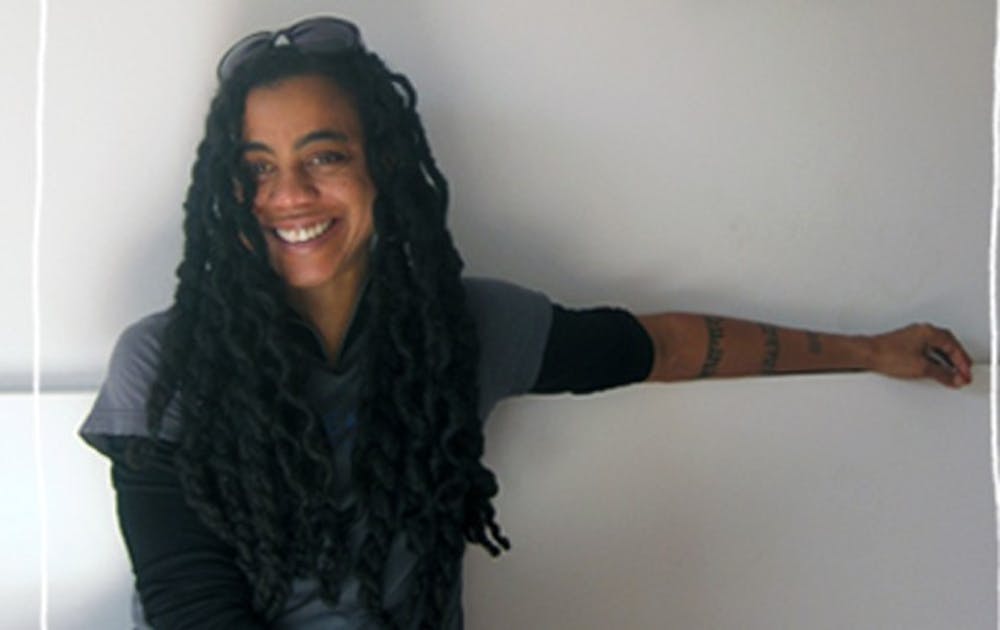“Sometimes it hurts to bloom.” This is but one of a “million suggestions” that Suzan-Lori Parks has written down and will present to her audience at 6 p.m. tonight at the Duke Coffeehouse.
Masterfully traversing and experimenting across mediums, Suzan-Lori Parks is a grantee of the MacArthur Foundation “Genius” Grant and the first black woman to win a Pulitzer Prize for Drama. A playwright, teacher, screenwriter, essayist and novelist, her most renowned works are those in the theater, where she layers both time and space. Unlike film, the audience’s perspective is left uncontrolled, yet unlike the novel, a work of theater is not left entirely up to the imagination. Parks’s work is meant to be realized—physically, visually and aurally—by bringing her audience into the complexity and unsettlement that characterize her plays.
“She’s important because she’s a person whose plays must be done in order to be understood,” says Jules Odendahl-James, resident dramaturg and a visiting lecturer in Theater Studies. “They really demand embodiment. She is playing with specific notions of rhythm, of silence, of gaps between speech. She gets into the physical nature of relationships, which makes her stand out as a particular kind of American playwright. She is interested in inviting us to consume uncomfortable things.”
Parks brazenly commands a multitude of styles and new trajectories into history and storytelling. Notably, she worked on the film adaptation of Zora Neale Hurston’s Their Eyes Were Watching God, and she wrote the screenplay for Spike Lee’s Girl 6. The American Play (1995) reenacts the story of a black man reenacting Lincoln. She weaves semi-recurring characters into her work—her magnum opus, Topdog/Underdog (2001), features two black brothers named Lincoln and Booth.
At the beginning of her essay, “Elements of Style,” Parks explains, “I want to examine what seems to me a real crisis in American dramatic literature. I’m hoping to form a sort of bulwark against an insidious, tame-looking, schmaltz-laden mode of expression that threatens to cover us all...”
Parks is forcing her audience to realize that there’s more than one way to write. This includes the words on the page, how things are ordered, the particular dynamics unique to each playwright and the need to be aware of such things. She is concerned with what language one must learn in order to know what this world says—what, says Odendahl-James, “makes [Parks’s plays] breathe.”
Kathy Williams, director of UNC-Chapel Hill’s current undergraduate production of Parks’ 1996 play, Venus, echoes the same feeling of captivation in Parks’ work. “She deconstructs and reconstructs in new ways so that we can find the relevance in our lives. Her theatricality is refreshing. She’s not content to create the standard two-act tension for drama... There’s a sort of physical theatricality around the piece, and within her framework, there’s a lot of freedom.”
If you can imagine, Venus is the story of Sarah “Saartjie” Baartman, a woman taken from South Africa to be put on display in Europe as an exhibit. Though Baartman is a lesser-known historical figure, Parks addresses Baartman’s utter exploitation and explores history’s impact on the present. Upon her death, Baartman was dissected and her preserved remains were left on display for well over a century. Parks begins with Baartman’s end, and proceeds, in a way, backwards in time.
“The ending is no longer a dramatic tension,” explains Odendahl-James, who is working on the UNC production alongside Williams. “Parks is able to manipulate our sense of expectation. It’s not what happened, it’s why it happened. We don’t always get an answer, but there is an uncomfortable mystery set out for us. That’s where we start, and we’re invited to critique why things happen the way they did.”
Venus, like all of Parks’ work, is difficult. Williams describes the process of Venus’ production, which will open on Apr. 11: “It’s complex. It’s very layered. As a director, that translates to what I think is at the core of the piece, which is a fumbling into the unknown territory of being. It’s refreshing and terrifying and exciting... It is physical and it has a pulse, so when you put it on stage, it comes to life.”
Suzan-Lori Parks turns art into life, and vice versa. Much of that is through her unconventional conveyance of meaning across divergent matter and medium. Her talk will carry that dynamic and productive frenzy: “It’s a performance; not a behind-the-podium kind of thing at all. I’ll give you a million suggestions in rapid succession. We’ll talk about the writing process, regardless of the kind of writing you do.”
When asked about an audience composed largely of college students, Parks immediately replies, “It’s one of my favorite audiences. You’re still in the process of formulating and figuring it out... You guys are making soup and I’m going to add carrots,” she laughs. “Everyone’s just trying to feel okay about the choices they’re making. It’s not just about the art. It’s using art to talk about life. So there are a million suggestions.”
I ask Parks for a suggestion. I can hear her scrambling through papers, looking for one to tell me today that she won’t read tomorrow. “Here’s one: Sometimes it hurts to bloom.” It’s a suggestion for spring. “That doesn’t mean to turn around in the other direction. It means to be okay with the process of growing, of being. Sometimes it hurts to bloom.”
Parks will speak at the Duke Coffeehouse tonight at 6 p.m. Admission is free. UNC-Chapel Hill’s Venus will premiere Apr. 11. More information at http://drama.unc.edu
Get The Chronicle straight to your inbox
Signup for our weekly newsletter. Cancel at any time.

